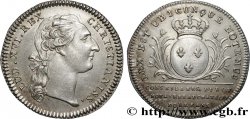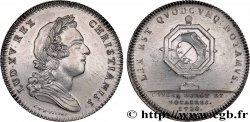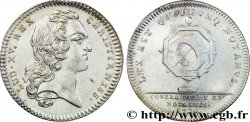E-auction 136-76541 - fjt_079454 - ROYAL NOTARIES Notaires de Lyon 1715
You must signin and be an approved bidder to bid, LOGIN TO BID. Accounts are subject to approval and the approval process takes place within 48 hours. Do not wait until the day a sale closes to register. Clicking on « bid » constitutes acceptance of the terms of use of cgb.fr private e-auctions.
Bids must be placed in whole Euro amounts only. The sale will start closing at the time stated on the item description; any bids received at the site after the closing time will not be executed. Transmission times may vary and bids could be rejected if you wait until the last second. For further information ckeck the E-auctions F.A.Q.
NO BUYER'S FEE.
NO BUYER'S FEE.
| Estimate : | 55 € |
| Price : | 31 € |
| Maximum bid : | 32 € |
| End of the sale : | 23 November 2015 18:57:00 |
| bidders : | 6 bidders |
Type : Notaires de Lyon
Date: 1715
Metal : silver
Diameter : 30 mm
Orientation dies : 6 h.
Edge : striée
Coments on the condition:
Légères marques de manipulation, un très bel exemplaire
Catalogue references :
Obverse
Obverse legend : MES LES CONSERS DU ROY. NOTAIRES. DE LION.
Obverse description : Armes de France couronnées encadrées de deux anges et au-dessus d'un lion couché à gauche.
Reverse
Reverse legend : LEX. EST. QVODCVMQ. NOTAMVS..
Reverse description : Le gnomon sur une console, au-dessous 1715.
Reverse translation : (Est Loi ce que nous consignons).
Commentary
Les notaires royaux étaient institués près des justices royales. Ils ne pouvaient instrumenter hors du ressort de celle auprès de laquelle ils étaient établis à l'exception des notaires au Châtelet qui avaient le privilège de pouvoir le faire dans toute la France. Comme officiers publics, ils étaient chargés de dresser les actes et contrats auxquels les parties veulent donner un caractère d'authenticité. En 1597, les tabellions, chargés de garder les minutes et de délivrer des grosses, deviennent des notaires garde notes et garde scel mais ils se confondent rapidement avec les notaires chargés de recevoir. L'édit de juillet 1682 exigeait profession de la religion catholique, attestation de bonne vie et mœurs par le curé et un examen pour être reçu notaire.








 Report a mistake
Report a mistake Print the page
Print the page Share my selection
Share my selection Ask a question
Ask a question Consign / sell
Consign / sell
 Full data
Full data



